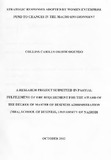| dc.description.abstract | Organizations exist in a complex, dynamic, and volatile political, economic, social,
technological, cultural, environmental, legal, and ecological environments. In order to
survive, strategies have to be crafted to respond to the threats posed. The objective of this
study was to determine the macro environmental changes facing WEF and to establish
the strategic responses adopted by WEF to overcome the challenges. The study was a
case study. An interview guide was used as the primary data collection instrument to
conduct face to face interviews to the CEO, departmental heads, regional coordinators
and other managers at WEF. Content analysis was selected as the appropriate method for
data analysis. This method was chosen for its breadth which makes it a flexible and wideranging
tool that may be used as a stand–alone methodology or as a problem specific
technique. The study also found out that WEF was faced by challenges such as political
instability in the country, insecurity due to militia activities and other factors, terrorism
threats, inadequate legislations, high inflation rate, fluctuating exchange rates, climatic
changes, low technological advancements, high dependency ratio, poverty, high
population growth rate, religion, increased customer demands, high unemployment, and
cultural influences on customer needs. The study concludes that WEF had adopted
various strategies to respond to the environmental changes. These strategies were found
to broadly border on cost reduction measures, enhancement of efficiencies,
partnerships/alliances, differentiation, upgrading the ICT, restructuring, outsourcing of
noncore services and focus strategies. The study found out that the strategies adopted
were both proactive and reactive and that they were generally successful with only
limited shortcomings. The study recommends that WEF should employ various response
strategies aimed at tackling insufficient funding. Further, that the fund diversifies its
product offering and to improve the turn around time. Also recommended was that the
DGSDOs, CWEFLC, Volunteers, and CDAs be trained appropriately. Finally, the Fund
should work towards retaining experienced Volunteers. | en |

